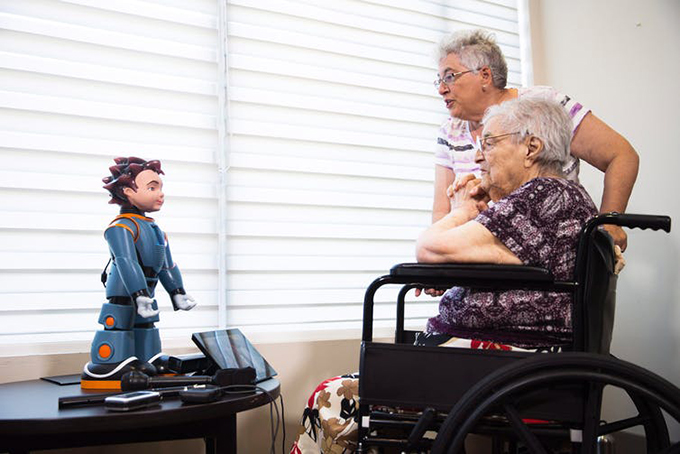
Technology critics and defenders alike argue that human jobs are being eliminated by workplace automation, minimizing the need for human interaction.
Another way to see it is that emerging tech is increasing our capacity to focus our collective energies — on the social, cultural, ethical and emotional demands of our rapidly changing world.
Everything from smart phones to smart cities are freeing us up to care more for others and to commit more resources to transforming the parts of our societies and economies where need and inequities persist.
Automation creates new opportunities to privilege, value and grow human interaction, soft skills and our mutual understanding of and appreciation for people.
Supporting the well-being of Canadians
Canada is well positioned here. The country began long ago to shift away from manufacturing in favour of a service-based economy.
Today, as more and more baby boomers reach retirement age, health care is one of the fastest growing industries. Economic powerhouses like education, public administration, retail, finance, real estate and communications continue to grow. Service industries represent more than 70 per cent of Canada’s gross domestic product (GDP) and this share will only increase over time.

Ludwig, a two-foot-tall robot, was created by University of Toronto researchers to engage people with Alzheimer’s disease and dementia. (THE CANADIAN PRESS/Michelle Siu)
The implication, then, is that the country’s present and future depend very much on our ability to understand and meet the needs of people. This means investing in the research, education and skills training opportunities that support the well-being of Canadians.
Here again Canada is headed in the right direction. Earlier this year, Canada’s Fundamental Science Review Panel submitted its final report to Minister of Science Kirsty Duncan, on the state of basic and applied research.
The study identified gaps in the country’s research ecosystem and made recommendations to enhance Canada’s investigator-led research capacity. The panel’s remit was broad, examining research inquiry and apparatus in science, technology, engineering and math through to health sciences, social sciences and humanities.
Much of the debate that followed has focused on where and how to spend federal research dollars to improve the country’s knowledge production, innovation capacity and path to prosperity.
More of the debate needs to focus on why Canada must invest in research for end-users in the public, private and not-for-profit sectors without shortchanging teaching, learning and skills development.
The challenge of serving others
To build research capacity we need to build skills, training and knowledge translation capacity. The three go hand in hand.
The real and potential economic and social value of research carried out in Canada’s post-secondary education institutions is not well understood or communicated to the various stakeholder groups that stand to benefit.
It is not well understood, for example, that research funding distributed through our federal granting agencies is contributing to the training and skills development of undergraduate and graduate students involved in research.
Or that the toughest tasks these future workers will face won’t be technical, but interpersonal — working with, understanding and serving others.

Automation frees time and resources to invest in societal challenges such as affordable housing. Here homeless people pitch tents in Victoria’s wealthy Oak Bay in 2017 to draw attention to housing shortages for disadvantaged people across British Columbia. (THE CANADIAN PRESS/Dirk Meissner)
Canada’s research community must do more to translate and transfer the practical benefits of its work. And, alas, there’s no easy way to automate the process.
Emotional labour is key to growth
What this means for now is that we’re undermining our own potential to address complex challenges — social, scientific or otherwise — to innovate and allocate our resources. School boards, universities, polytechnics and colleges all have important roles to play. So do employers.
Studies of employers, human resources staff and job databases have shown steadily growing demand over the past 35 years for soft skills, social skills or what one writer for Aeon magazine recently called “emotional labour.”
In economic terms, these skills are the key to productivity and growth in the service industries. Which is why the time and money that technology saves us must be reinvested — in cultivating, contextualizing, communicating with and caring for people.
There will soon be an algorithm to diagnose your health problem, a driverless air taxi to take you to the hospital and a robot to perform surgery on you, while post-op or palliative care will be handled by a team of sociable machines.
If we under-invest in the research and training that support the development of social, emotional and communication skills in relentless pursuit of research commercialization or bigger and better robots, we’ll miss the crucial opportunity that new technology affords us.
Canada might up end making better things, not making things better.
Author Bio: Matthew McKean is an Adjunct Research Professor, Department of History at Carleton University
